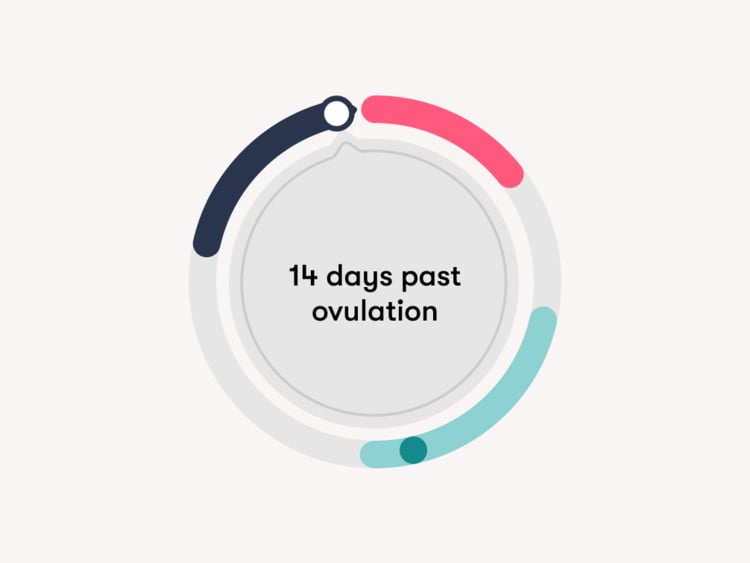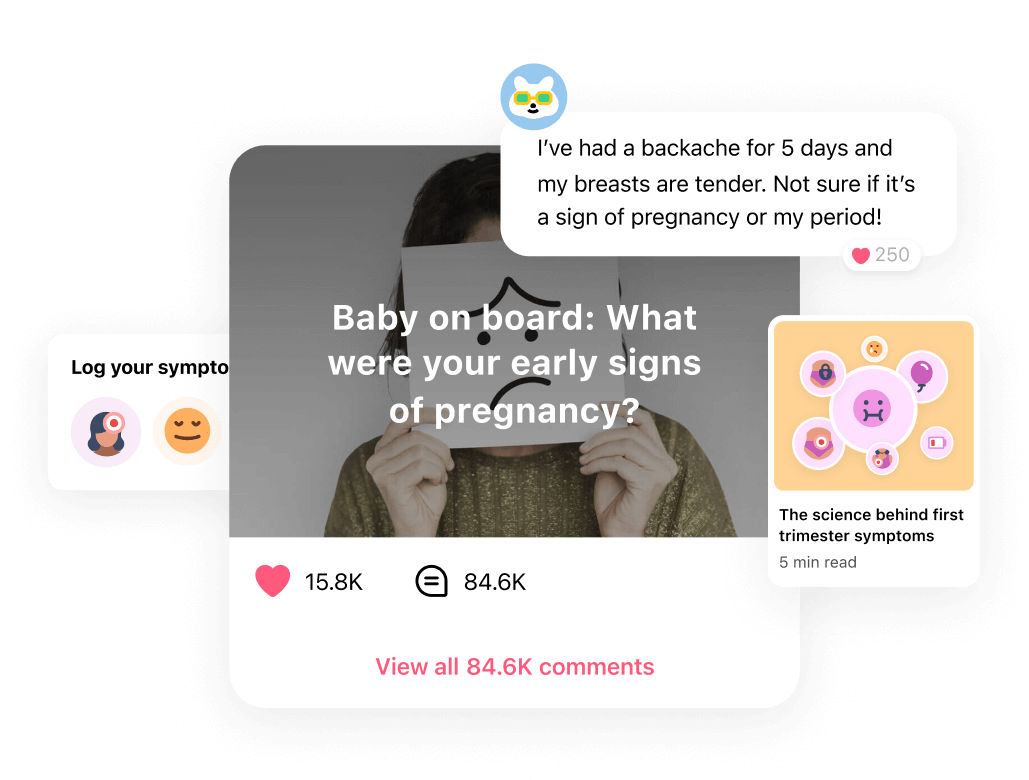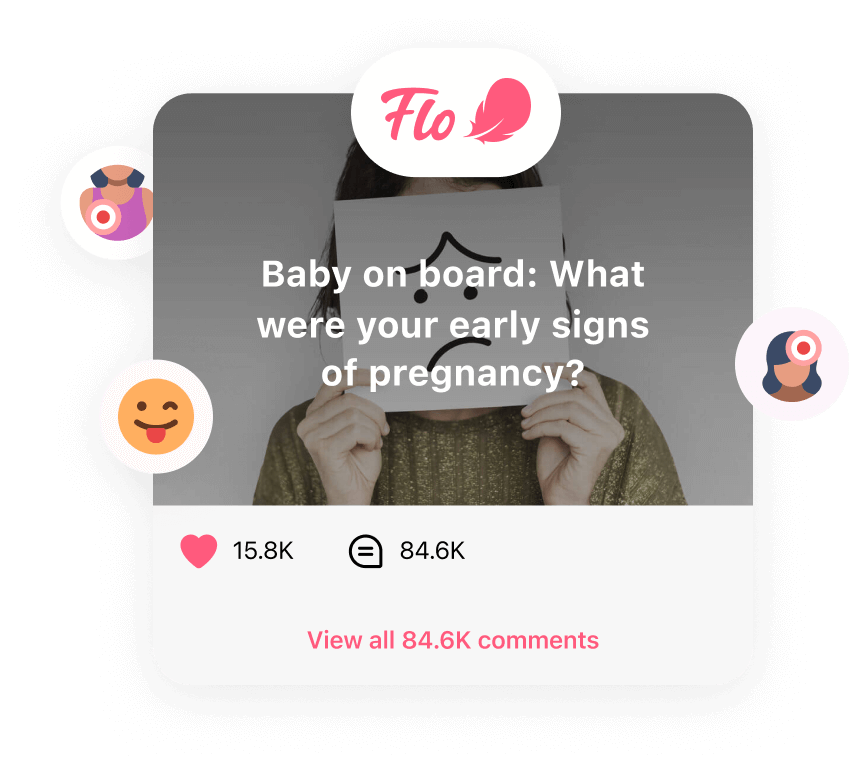It’s normal to be looking for signs that you’re pregnant, but is it too early to tell? Here’s the lowdown on 14 DPO, including whether you can take a test.
-
Tracking cycle
-
Getting pregnant
-
Pregnancy
-
Help Center
-
Flo for Partners
-
Anonymous Mode
-
Flo app reviews
-
Flo Premium New
-
Secret Chats New
-
Symptom Checker New
-
Your cycle
-
Health 360°
-
Getting pregnant
-
Pregnancy
-
Being a mom
-
LGBTQ+
-
Quizzes
-
Ovulation calculator
-
hCG calculator
-
Pregnancy test calculator
-
Menstrual cycle calculator
-
Period calculator
-
Implantation calculator
-
Pregnancy weeks to months calculator
-
Pregnancy due date calculator
-
IVF and FET due date calculator
-
Due date calculator by ultrasound
-
Medical Affairs
-
Science & Research
-
Pass It On Project New
-
Privacy Portal
-
Press Center
-
Flo Accuracy
-
Careers
-
Contact Us
14 DPO: Are there any pregnancy symptoms at 14 days past ovulation?


Every piece of content at Flo Health adheres to the highest editorial standards for language, style, and medical accuracy. To learn what we do to deliver the best health and lifestyle insights to you, check out our content review principles.
From a missed period and mood changes to sore boobs and nausea, symptoms of early pregnancy can be pretty different for everyone. If you’re trying for a baby, then you may be on high alert for every new ache or feeling. This is totally understandable.
Many experts recommend waiting until the first day of a missed period before taking a pregnancy test. Waiting to take a test can be pretty all-consuming, but 14 days past ovulation (DPO) might align with when your period is due and the earliest time you can take a pregnancy test. Finally, right? However, this isn’t the same for everyone. The first day of your missed period will really depend on your cycle length overall.
So here’s the lowdown on 14 DPO, including what might be happening in your body right now and how to determine the right time to take a test for you.
Key takeaways
- Implantation (when a fertilized egg attaches to the lining of your uterus) marks the official start of pregnancy. This usually happens between 6 and 10 DPO. This means that if implantation happened this cycle, then you might already be pregnant.
- If you haven’t noticed any telltale early pregnancy symptoms at 14 DPO, try not to worry. This doesn’t mean you’re not expecting, as it’s still very early days.
- Many doctors recommend that you wait to take a pregnancy test until the first day of your missed period. This could be around 14 DPO. Waiting ensures that your levels of the pregnancy hormone human chorionic gonadotropin (hCG) are high enough to be picked up in your urine. They rise in the first weeks of pregnancy.
- It can be tempting to reach for a test before you’ve missed your period, but if you test too early, you run the risk of getting a false negative.

 Over
7.8M
ratings averaging
4.8/5
*
Over
7.8M
ratings averaging
4.8/5
*
Understand your body’s signals with the Flo app
- Chat with others who are trying to get pregnant.
- Get trusted information on signs of pregnancy from 100+ medical experts.
- Log your symptoms and learn what they could be trying to tell you.
 Over
7.8M
ratings averaging
4.8/5
*
Over
7.8M
ratings averaging
4.8/5
*

Trying to conceive?
The Flo app can help you through the two-week wait.

 Over
7.8M
ratings averaging
4.8/5
*
Over
7.8M
ratings averaging
4.8/5
*
Understand your body’s signals with the Flo app
- Chat with others who are trying to get pregnant.
- Get trusted information on signs of pregnancy from 100+ medical experts.
- Log your symptoms and learn what they could be trying to tell you.
14 DPO: What to expect
DPO — or days past ovulation — is the number of days since one of your ovaries last released an egg to potentially be fertilized by a sperm. So, if you’re 14 DPO, one of your ovaries released an egg roughly two weeks ago, and you’re right at the end of the luteal phase of your cycle. Just in case you’re not very familiar with the different phases of your cycle, let’s break them down.
Your cycle is split into two parts: your follicular and luteal phases.
- The follicular phase: The first part of your cycle is called your follicular phase, and it starts on the first day of a new period. Easy to remember, right? If your cycle is around 28 days, then your follicular phase covers the first 14. During this time, your estrogen levels rise, and the lining of your uterus thickens in preparation for a potential pregnancy.
- The luteal phase: Between days 14 and the end of your cycle, you enter your luteal phase. It starts after ovulation, which is when one of your ovaries releases an egg. Following this, your progesterone levels rise.
At 14 DPO, you’re at the very end of your luteal phase. This means that if you did get pregnant this cycle, a fertilized egg traveled down your uterine tube and implanted into the lining of your uterus. This generally happens around six to 10 days after you ovulate (or 6 to 10 DPO). Your body then starts to grow your placenta — a whole new organ that supports your developing fetus and releases the pregnancy hormone hCG. It’s this hormone that pregnancy tests look for in your urine.
While there’s no way to know the specific day when implantation happened, you might have been pregnant for around a week at this point. This is incredibly exciting. However, not knowing may make you all the more eager to do a test. So, can you take one at 14 DPO?
Can I take a pregnancy test at 14 DPO, or is it too early?
Experts recommend that you wait at least until the first day of your missed period before taking a pregnancy test. The timing of this means slightly different things for different people, as it’s entirely based on how long your cycle is. However, 14 DPO is usually the earliest time you can do one. That’s today.
“HCG is detectable in the blood about six to 11 days after conception, but it takes slightly longer to appear on at-home pregnancy tests that measure hCG in urine,” explains Dr. Nazaneen Homaifar, obstetrician and gynecologist, Inova Health System, Washington, DC, US.
The logic goes that if you’re expecting, the longer you wait to do a pregnancy, the higher your hCG levels will be, and the easier they will be to detect with a test. It’s important to give your body enough time to produce enough hCG, or you risk getting a false-negative or a very faint positive result.
Your cycle is really personal to you. Everyone’s cycle length is slightly different, but yours is considered normal if it’s between 21 and 35 days. So, if you have an irregular cycle, the first day of your missed period may still be a couple of days away. If you aren’t quite sure how long your cycle is, try to map out on a calendar the dates between your last periods. That will give you your overall cycle length. You can then figure out when your next period is due and the earliest time it’s recommended that you do a test. While this can be frustrating, it won’t be long until you can take a test.
How to take a pregnancy test
If 14 DPO marks the earliest point in your cycle you can take a test, it can be handy to know when and how to do one. Provided you use them at the right time and exactly as instructed, most at-home pregnancy tests are 99% accurate. To maximize your chances of getting an accurate home pregnancy test result, it’s a good idea to keep the following points in mind.
- Consider where and when you’ll take the test. If you’ve been anxiously waiting, finally reaching the day when your hCG levels might be high enough can be a real mix of emotions. This is totally understandable. However, before you take a test, think about the different factors that may make you feel as calm as possible. Would you rather do the test by yourself or with a loved one? Would you want to do it at home or somewhere else? Who will you tell about the result? It can help to have a plan in place that works for you.
- Read the directions that come with the test and follow every step exactly. If you want to take a few minutes to familiarize yourself with the information leaflet before you take your test, then take your time. There’s no rush.
- Don’t forget to check the expiration date on the packet.
- Test first thing in the morning. “For the most accurate results, take the test right after you get up in the morning. That’s when your urine is the most concentrated, making hCG easier to detect,” says Dr. Homaifar.
- Try not to drink excessive fluids before you take a pregnancy test. You might think this would be a way to ensure that you have lots of urine, but this can dilute your hCG levels.
- To reduce the chance of getting a false-negative result, take the test after you miss your period.

Understanding your pregnancy test results
Most at-home pregnancy tests come with a leaflet that outlines what a negative and positive result might look like. A positive result may be shown by a plus sign, a line, or the word “pregnancy.” It can be slightly different for different brands of tests.
If you get a positive pregnancy test result at 14 DPO, then congratulations, you may be expecting. The best next thing to do is reach out to your doctor to discuss next steps.
If you get a negative pregnancy test result at 14 DPO, this doesn’t necessarily mean that you aren’t pregnant. “Depending on how long your menstrual cycle is, or if you have irregular cycles and therefore ovulated later, you may still be pregnant but not able to detect the pregnancy so early on,” says Dr. Homaifar. “If you get a negative test result, but you still think you might be pregnant, take another test one week after your missed period or contact your health care provider and make sure you didn’t check the test results too soon.”
Pregnancy symptoms at 14 DPO
By 14 DPO, your hCG levels may be high enough to be detected on a test, but you might not feel any different. Try not to worry. If you’re expecting, then it’s still very early days. Similarly, it can be tough to spot signs of early pregnancy and symptoms that would suggest your period is on the way, as they can look fairly similar.
So here are some symptoms you might feel at 14 DPO and why:
Spotting
If you notice light bleeding outside of your period at 14 DPO, then this could be spotting. It can be caused by lots of things, including changes in your hormone levels and irritation during sex. It’s usually nothing to worry about, but bleeding before your period can be scary, so don’t hesitate to reach out to your doctor for a checkup if you’re worried. Spotting or bleeding at 14 DPO could also be your period starting.
Spotting in the weeks before your period could also be a sign that a fertilized egg has attached to the lining of your uterus. This is called implantation bleeding. However, the best way to confirm that you’re pregnant is by doing a test on or after the first day of your missed period.
Breast pain
Have you noticed that your boobs feel sore or swollen before the start of your period? This is called cyclical breast pain and happens as your hormone levels fluctuate. Early pregnancy is another time when you go through big hormonal changes, so your boobs may feel more sensitive then, too.
Nausea
If you’ve been experiencing waves of nausea at 14 DPO, then it could be due to fluctuations in your hormones during your luteal phase. This is sometimes described as period nausea. Similarly, so-called “morning sickness” is a common early pregnancy symptom. But, despite the name, it can happen at any time of the day or night and is more accurately known as “pregnancy nausea and vomiting.” This can be linked to a surge in pregnancy hormones following implantation.
Take a quiz
Find out what you can do with our Health Assistant
Frequent urination
Struck by a sudden need to pee more often? If you’re making more frequent trips to the bathroom during the day and night, it could be a sign that you’re drinking too much fluid, you’re drinking more caffeine or alcohol, or — if it’s accompanied by symptoms like burning and a funny smell — you might have a urinary tract infection, which is easily treated. Be sure to book a checkup with your doctor if that’s you.
Needing to pee more often is also a common early pregnancy symptom. As your hormones fluctuate, it can lead to loosening of your pelvic floor muscles, which hold your bladder in place. An increase in progesterone can also cause these muscles to become more flexible. Similarly, your blood volume increases during pregnancy to support you and your growing fetus. This means that your kidneys have to work extra hard to filter impurities, which leave your body in your urine.
Mood swings
You may be no stranger to mood changes in the week before your period. The things that you would normally ignore can become incredibly annoying. You can blame this on changes in your hormones. Because early pregnancy is another time when your hormones fluctuate, you might feel similar mood changes. Try to be gentle with yourself.
14 DPO and no symptoms
Learning the different signs and symptoms of early pregnancy and PMS may help you understand what you might be feeling. However, you might not have noticed any changes yet. If you’re trying to conceive and don’t feel any different at 14 DPO, it can be really anxiety inducing. Try not to worry. Every pregnancy is unique, and some people don’t have any pregnancy symptoms for a few weeks. It doesn’t necessarily mean you’re not pregnant. The best way to confirm if you’re pregnant is to take a test on the first day of a missed period.
More FAQs
What is cervical mucus like at 14 DPO?
Your cervix is the tube-like muscle at the opening of your uterus. It produces discharge-like mucus that can change as your hormone levels fluctuate. After ovulation, your cervical mucus typically dries up, before you eventually get your period. However, if you notice an increase in cervical mucus at 14 DPO that is thin and clear or milky white, this could indicate pregnancy.
How do I know if implantation was successful?
Once implantation happens, your body releases hCG, the hormone that pregnancy tests detect to deliver a positive result. There’s no way to know for sure that implantation has happened. The only way to know if you’re pregnant is to take a pregnancy test after a missed period.
How to calculate 14 DPO
If you’d like to figure out how many days past ovulation you are, all you need to do is figure out how long your cycle typically is, the day you ovulated, and how many days it’s been since that date. For example, if you ovulated on the 5th of the month, and it’s now the 19th, you’re 14 DPO. You can either use an app like Flo to do this or an ovulation calculator.


Hey, I'm Anique
I started using Flo app to track my period and ovulation because we wanted to have a baby.


The Flo app helped me learn about my body and spot ovulation signs during our conception journey.


I vividly
remember the day
that we switched
Flo into
Pregnancy Mode — it was
such a special
moment.
Real stories, real results
Learn how the Flo app became an amazing cheerleader for us on our conception journey.
References
“1st Trimester Pregnancy: What to Expect.” Mayo Clinic, 8 Mar. 2022, www.mayoclinic.org/healthy-lifestyle/pregnancy-week-by-week/in-depth/pregnancy/art-20047208.
“Week 4.” NHS, www.nhs.uk/start-for-life/pregnancy/week-by-week-guide-to-pregnancy/1st-trimester/week-4/. Accessed 5 Dec. 2023.
“Am I Pregnant?” Cleveland Clinic, my.clevelandclinic.org/health/articles/9709-pregnancy-am-i-pregnant. Accessed 16 Nov. 2023.
Betz, Danielle, and Kathleen Fane. “Human Chorionic Gonadotropin.” StatPearls, StatPearls Publishing, 14 Aug. 2023, www.ncbi.nlm.nih.gov/books/NBK532950/.
“Bleeding during Pregnancy.” The American College of Obstetricians and Gynecologists, www.acog.org/womens-health/faqs/bleeding-during-pregnancy. Accessed 5 Dec. 2023.
“Cervical Mucus.” Cleveland Clinic, my.clevelandclinic.org/health/body/21957-cervical-mucus. Accessed 5 Dec. 2023.
“Changes during Pregnancy.” The American College of Obstetricians and Gynecologists, Nov. 2023, www.acog.org/womens-health/infographics/changes-during-pregnancy.
Cheung, Katharine L., and Richard A. Lafayette. “Renal Physiology of Pregnancy.” Advances in Chronic Kidney Disease, vol. 20, no. 3, May 2013, pp. 209–14, https://doi.org/10.1053%2Fj.ackd.2013.01.012.
“Common Health Problems in Pregnancy.” NHS, www.nhs.uk/pregnancy/related-conditions/common-symptoms/common-health-problems/. Accessed 5 Dec. 2023.
“Doing a Pregnancy Test.” NHS, www.nhs.uk/pregnancy/trying-for-a-baby/doing-a-pregnancy-test/. Accessed 5 Dec. 2023.
“Follicular Phase.” Cleveland Clinic, my.clevelandclinic.org/health/body/23953-follicular-phase. Accessed 5 Dec. 2023.
“Frequent Urination.” Mayo Clinic, 19 May 2023, www.mayoclinic.org/symptoms/frequent-urination/basics/causes/sym-20050712.
Gudipally, Pratyusha R., and Gyanendra K. Sharma. “Premenstrual Syndrome.” StatPearls, StatPearls Publishing, 17 July 2023, www.ncbi.nlm.nih.gov/books/NBK560698/.
“Home Pregnancy Tests: Can You Trust the Results?” Mayo Clinic, 23 Dec. 2022, www.mayoclinic.org/healthy-lifestyle/getting-pregnant/in-depth/home-pregnancy-tests/art-20047940.
“Pregnancy and Bladder Control.” Cleveland Clinic, my.clevelandclinic.org/health/diseases/16094-pregnancy-and-bladder-control. Accessed 5 Dec. 2023.
“Luteal Phase.” Cleveland Clinic, my.clevelandclinic.org/health/articles/24417-luteal-phase. Accessed 5 Dec. 2023.
“Periods and Fertility in the Menstrual Cycle.” NHS, www.nhs.uk/conditions/periods/fertility-in-the-menstrual-cycle/. Accessed 5 Dec. 2023.
“Menstrual Cycle: What’s Normal, What’s Not.” Mayo Clinic, 22 Apr. 2023, www.mayoclinic.org/healthy-lifestyle/womens-health/in-depth/menstrual-cycle/art-20047186.
“Ovulation.” Cleveland Clinic, my.clevelandclinic.org/health/articles/23439-ovulation. Accessed 5 Dec. 2023.
“Placenta.” Cleveland Clinic, my.clevelandclinic.org/health/body/22337-placenta. Accessed 5 Dec. 2023.
“Pregnancy Tests.” Cleveland Clinic, my.clevelandclinic.org/health/diagnostics/9703-pregnancy-tests. Accessed 5 Dec. 2023.
“Premenstrual Syndrome (PMS).” Mayo Clinic, 25 Feb. 2022, www.mayoclinic.org/diseases-conditions/premenstrual-syndrome/symptoms-causes/syc-20376780.
Su, Ren-Wei, and Asgerally T. Fazleabas. “Implantation and Establishment of Pregnancy in Human and Nonhuman Primates.” Advances in Anatomy, Embryology, and Cell Biology, vol. 216, 2015, pp. 189–213, https://doi.org/10.1007%2F978-3-319-15856-3_10.
Thiyagarajan, Dhanalakshmi K., et al. “Physiology, Menstrual Cycle.” StatPearls, StatPearls Publishing, 24 Oct. 2022, www.ncbi.nlm.nih.gov/books/NBK500020/.
“Urinary Tract Infections (UTIs).” The American College of Obstetricians and Gynecologists, Jan. 2023, www.acog.org/womens-health/faqs/urinary-tract-infections.
“Vaginal Discharge in Pregnancy.” NHS, www.nhs.uk/pregnancy/related-conditions/common-symptoms/vaginal-discharge/. Accessed 5 Dec. 2023.
“What Causes Bleeding between Periods?” NHS, www.nhs.uk/common-health-questions/sexual-health/what-causes-bleeding-between-periods/. Accessed 5 Dec. 2023.
History of updates
Current version (15 December 2023)
Published (17 June 2019)
In this article

Get your personal guide to fertility
-
Learn how to read your body's ovulation signals
-
Find daily conception tips from our experts
-
Chat with others who are trying to get pregnant




